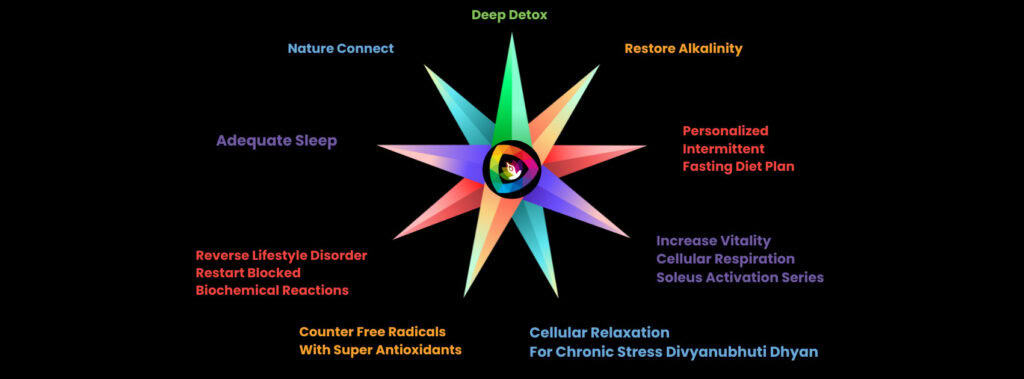Happiness: Rediscovering Our Natural State 🌟

Happiness—what a profound and elusive concept! Yet, as Deepak Chopra beautifully articulates, it is not something we chase but something we allow. Happiness is our natural state, a radiant part of our existence often obscured by our relentless pursuit of external validation and material success. Let us embark on an intellectual and spiritual exploration of happiness, weaving together insights from ancient wisdom and modern science.
The Essence of Happiness 🕉️
Happiness, at its core, is not a fleeting emotion or a material possession. It is a state of being, a reflection of our alignment with the rhythm of the universe. Aristotle, the Greek philosopher, described happiness as “eudaimonia,” a state of flourishing achieved through virtue and self-actualization. Similarly, Chopra emphasizes that happiness arises when we shed resistance and embrace our interconnectedness with life.
As Dr. Ashutosh Rastogi highlights in his wellness research, vitality and happiness are deeply rooted in our cellular health. When our cells are balanced and energized, they create the foundation for mental and emotional harmony. This fusion of science and spirituality reveals that happiness is not a destination but a symbiotic process of self-discovery and connection.
Breaking Free from Illusions 🔗
Five common illusions often obscure our happiness:
- Fear 😨: Fear of the unknown limits our potential and diminishes joy. Jiddu Krishnamurti, the great Indian philosopher, reminds us, “The constant assertion of belief is an indication of fear.”
- Ego 🪞: Over-identification with the self creates separation and suffering. As Buddha taught, “In the sky, there is no distinction of east and west; people create distinctions out of their own minds and then believe them to be true.”
- Attachment 🤝: Clinging to people or things creates insecurity. The Bhagavad Gita warns, “Attachment leads to desire, and from desire arises anger, the ultimate destroyer of peace.”
- Resistance ⚔️: Fighting life’s natural flow invites dissatisfaction. Lao Tzu advises, “Life is a series of natural and spontaneous changes. Don’t resist them; that only creates sorrow.”
- Mortality 💀: Fear of death robs us of the present moment. Dr. Elisabeth Kübler-Ross, a pioneer in near-death studies, taught that accepting mortality leads to profound appreciation of life.
By transcending these illusions, we can uncover the boundless joy that lies within.
The Journey Inward 🧘♀️
Happiness is a journey, not a destination. To embark on this path, we must turn inward. Here are some practices supported by both science and ancient wisdom:
1. Meditation 🕊️
Meditation calms the mind, enhances cellular relaxation, and fosters clarity. Neuroscientist Dr. Sara Lazar has shown that regular meditation increases gray matter in the brain, enhancing emotional regulation and well-being.
2. Pranayama 🌬️
Ancient yogis knew that breath is the bridge between body and mind. Dr. Marc Hamilton’s studies on soleus activation and kapalbhati pranayama reveal how these practices increase oxygen uptake, improve mitochondrial function, and boost metabolic activity—creating a foundation for happiness.
3. Cultivating Compassion ❤️
Happiness multiplies when shared. Dalai Lama, a global spiritual leader, emphasizes, “If you want others to be happy, practice compassion. If you want to be happy, practice compassion.”
Practical Steps Toward Happiness ✨
- Reframe Your Perspective 🔄: Happiness is an internal state, not an external achievement. Epictetus, the Stoic philosopher, reminds us, “Happiness and freedom begin with a clear understanding of one principle: some things are within our control, and some things are not.”
- Release Attachments ✂️: Identify emotional and material dependencies. Eckhart Tolle, in The Power of Now, writes, “Attachment to things drops away by itself when you no longer seek to find yourself in them.”
- Foster Curiosity 🔍: Approach life with wonder, like a child. Nobel laureate Dr. Albert Einstein said, “The important thing is not to stop questioning. Curiosity has its own reason for existence.”
- Embrace Gratitude 🌈: Gratitude shifts focus from what is lacking to what is abundant. A study by Dr. Robert Emmons, a leading gratitude researcher, found that gratitude improves physical and mental health, fostering happiness.
A Fusion of Science and Spirit 🔬🕉️
In initiatives like AnandBodh and WellPro, we see how science and spirituality converge to unlock human potential. The WellPro Wellness Protocol emphasizes the interconnectedness of cellular, mental, emotional, and spiritual health. Practices like soleus activation, pranayama, and detox therapies not only boost vitality but also cultivate a profound sense of joyThe AnandBodh Intro Dra…Introduction – Wellpro …Final Soleus Ad CreativeWellpro Wellness Protoc….
Final Thought
“Happiness,” as Chopra concludes, “is not something you pursue; it’s something you allow.” Let us shed the illusions that bind us, embark on the inward journey, and embrace the happiness that has been pursuing us all along. In doing so, we not only elevate our own lives but also contribute to a more compassionate, connected, and harmonious world.
References
- Deepak Chopra, The Ultimate Happiness Prescription
- Dalai Lama, The Art of Happiness
- Dr. Marc Hamilton, iScience Journal, 2022
- Jiddu Krishnamurti, Freedom from the Known
- Dr. Elisabeth Kübler-Ross, On Death and Dying
- Dr. Bruce Lipton, The Biology of Belief
Let us embrace this timeless truth and rediscover the joy that lies at the very heart of existence. 🌟







Responses